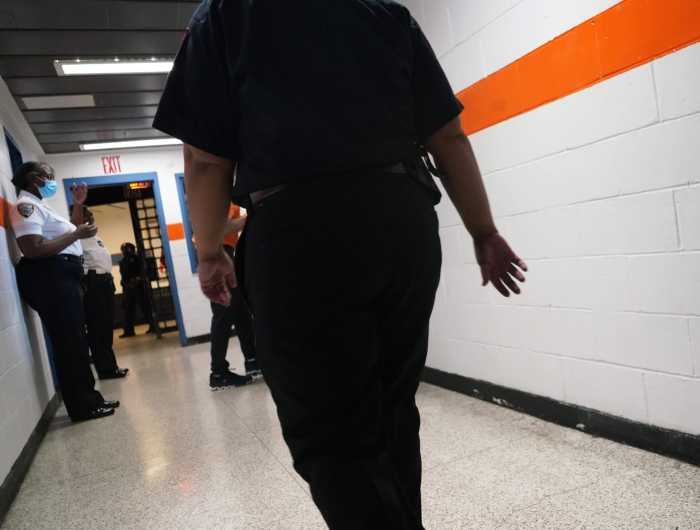Gavin Grimm, at a 2016 American Civil Liberties Union/ New York Civil Liberties Union event in New York. | DONNA ACETO
In what could signal a disappointing end to a remarkable battle for transgender equality, the Richmond-based Fourth Circuit Court of Appeals has announced that instead of holding oral argument in Gavin Grimm’s lawsuit challenging the Gloucester County, Virginia, School Board’s bathroom access policy, it is sending the case back to the district court to determine whether the young man’s recent graduation from high school makes the case moot.
The three-judge panel had tentatively scheduled an oral argument for September to consider yet again whether District Judge Robert G. Doumar erred when he dismissed Grimm’s Title IX sex discrimination claim, but on August 2 it said more fact-finding by the district court about whether appellate jurisdiction has ended is necessary.
Grimm’s mother filed suit on his behalf against the school board in July 2015, the summer before his junior year, alleging that the board’s policy of requiring students to use restrooms based on their biological sex rather than their gender identity violated Grimm’s right to be free of sex discrimination protected under both Title IX of the Education Amendments Act of 1972 and the Equal Protection Clause of the 14th Amendment.
Fourth Circuit sends trans student bathroom issue back to district judge
In September of that year, Doumar ruled in favor of the school board’s motion to dismiss the Title IX claim, reserved judgment on the 14th Amendment constitutional claim, and denied Grimm’s motion for a preliminary injunction to allow him to use the boys’ bathrooms as he appealed the Title IX dismissal.
While the case was pending before Doumar, the Obama administration filed a joint statement from the Justice and Education Departments supporting Grimm’s claim that barring him from using the boys’ bathrooms violated Title IX, finding that anti-transgender discrimination was necessarily sex discrimination. In April of last year, the Fourth Circuit focused on the federal agencies’ statement and found that Doumar should have deferred to it. In response, Doumar, last June, issued the preliminary injunction Grimm had sought, which would have guaranteed him access to appropriate bathroom facilities during his final year in high school.
Even though both Doumar and the Fourth Circuit refused the school board’s motion that they stay the injunction pending its appeal, the Supreme Court did issue a stay prior to the start of school last fall. The high court was scheduled to take up the school board’s appeal on March 28, but after President Donald Trump took office his attorney general and education secretary, Jeff Sessions and Betsy DeVos, on February 22, withdrew the Obama policy on Title IX’s applicability to transgender students. The Trump administration asserts that the question is best decided at the state and local level, despite the issue being one of federal statutory interpretation.
The Supreme Court reacted to the new Trump administration posture by cancelling the oral argument, vacating the Fourth Circuit’s decision about deferring to a now-defunct federal government policy, and sending the case back to the Fourth Circuit to address the merits of Grimm’s appeal of Doumar’s original ruling.
The Gloucester County School Board now argues the case is moot given that Grimm has graduated. While Grimm asserts his possible “future attendance at alumni and school-community events” there give him a continuing concrete interest in resolving the issue he raised, the board says the question of alumni bathroom access — on which it made no commitment one way or the other — is not before the court.
The matter of a “concrete interest” is critical since courts do not have jurisdiction unless there is an “actual case or controversy” between the parties.
“Thus,” wrote the court, “a crucial threshold question arises in this appeal whether ‘one or both of the parties plainly lack a continuing interest’ in the resolution of this case such that it has become moot.”
Doumar, then, will not be ruling on the merits of the case, but should he conclude it is moot, Grimm could appeal that.
If the district judge instead returns the case to the Fourth Circuit for a ruling on whether the Title IX claim was appropriately dismissed, it may yet provide a vehicle for the American Civil Liberties Union’s LGBT Right Project and the ACLU Foundation of Virginia, which represent Grimm, to get this issue back before the Supreme Court.
This issue is also being litigated in other places, in some cases involving elementary school students, and it is possible that one of the other cases will get far enough along to knock at the Supreme Court’s door long before the plaintiff has graduated. On May 30, the Chicago-based Seventh Circuit Court of Appeals ruled, in Whitaker v. Kenosha (Wisconsin) Unified School District, that Title IX prohibits a public school from refusing to let transgender students use bathrooms appropriate for their gender identity. That is the ruling Grimm and the ACLU would like out of the Fourth Circuit.
The Republican Congress could conceivably intervene by amending Title IX to explicitly exclude transgender students from protection under its sex discrimination provisions — but that is unlikely so long as the Senate filibuster rule remains in place. So it’s likely the issue will one day get to the Supreme Court, with or without Gavin Grimm’s pioneering participation.



































